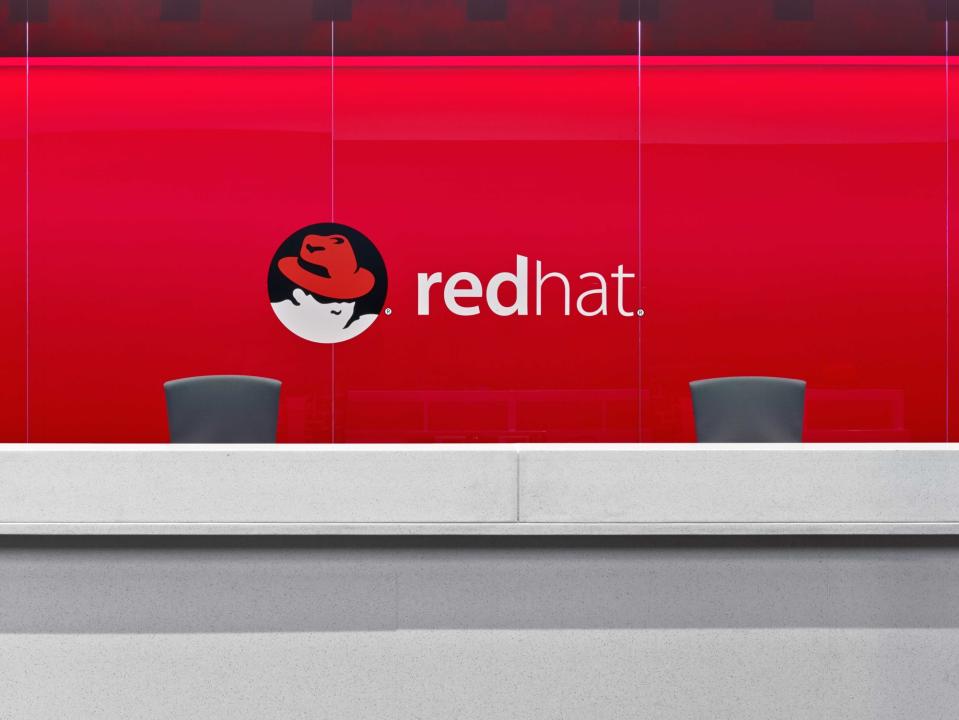Red Hat Reports Double-Digit Growth Ahead of IBM Deal
Red Hat (NYSE: RHT) is nearing the end of its time as a publicly traded company, with International Business Machines (NYSE: IBM) set to close its acquisition of the open-source software company sometime in the second half of this year. While IBM is paying a high price for Red Hat, it's getting a company well-positioned for the growth of hybrid cloud computing, and one that's growing revenue and earnings at double-digit rates.
Red Hat's fourth-quarter results, announced on March 25, were mixed relative to analyst expectations. But in absolute terms, the numbers were solid. Here's what investors need to know.

Image source: Red Hat.
Double-digit growth
Red Hat's revenue surpassed $3.4 billion for the full year, with $2.9 billion of that coming from subscriptions. Both total revenue and subscription revenue were up 15% from the previous year.
In the fourth quarter, the company managed similar growth rates:
Metric | Q4 2019 | Change (YOY) | Compared to Average Analyst Estimate |
|---|---|---|---|
Revenue | $879.0 million | 13.8% | Missed by $6.7 million |
Subscription revenue | $774.2 million | 13.3% | N/A |
Non-GAAP earnings per share | $1.16 | 26.1% | Beat by $0.15 |
Data source: Red Hat. YOY = year over year.
Currency negatively affected Red Hat's results during the fourth quarter. Total revenue would have grown 17% year over year at constant currency, and subscription revenue would have risen by 16%.
The largest piece of Red Hat's subscription revenue comes from infrastructure-related offerings. These products generated revenue of $549 million in the fourth quarter, up 8% on a reported basis and up 10% at constant currency. Application development-related subscription revenue came in at $225 million, a 30% increase on a reported basis and up 34% at constant currency.
Red Hat CEO Jim Whitehurst emphasized the company's success winning larger contracts in his remarks included in the earnings release. The total number of customers with active subscriptions worth more than $5 million rose 33% in fiscal 2019, and the company signed 17% more deals worth over $1 million. Whitehurst pointed out that this growth was despite a smaller base of large renewals compared to fiscal 2018.
Red Hat's backlog was above $4.1 billion at the end of fiscal 2019, up 22% year over year. Deferred revenue was $3 billion, up 15% year over year.
Higher revenue offset a slightly lower adjusted gross margin to drive a large increase in adjusted earnings per share. Other factors include adjusted operating expenses growing by just 11.1% year over year, a few percentage points slower than revenue growth, and a substantially lower tax rate. Red Hat's GAAP effective tax rate in the fourth quarter was 13.8%, down from 17.8% in the prior-year period.
Due to the impending acquisition by IBM, Red Hat didn't provide guidance or host an earnings call.
A massive opportunity
IBM sees the Red Hat acquisition as a way to better position itself to tap into what's expected to be a $1 trillion hybrid cloud opportunity by 2020. Around 80% of enterprise workloads haven't yet migrated to the cloud, and IBM is betting that a pure public cloud solution isn't the best option for most companies.
Red Hat sports higher margins than IBM, so the tech giant expects the deal to boost gross margin and cash flow in the first year, while boosting adjusted earnings per share in the second year. The opportunity to cross-sell products is part of the reason IBM shelled out roughly $34 billion for the software company. Red Hat generated about $1 billion of free cash flow in fiscal 2019, but that number could move substantially higher in the coming years if the combination goes according to plan.
Red Hat's fourth-quarter results were solid, even though they came up a bit short of analyst expectations. As part of IBM, Red Hat's revenue and earnings growth have the potential to accelerate as the combined company goes after the hybrid cloud market.
More From The Motley Fool
Timothy Green owns shares of IBM. The Motley Fool is short shares of IBM. The Motley Fool has a disclosure policy.
